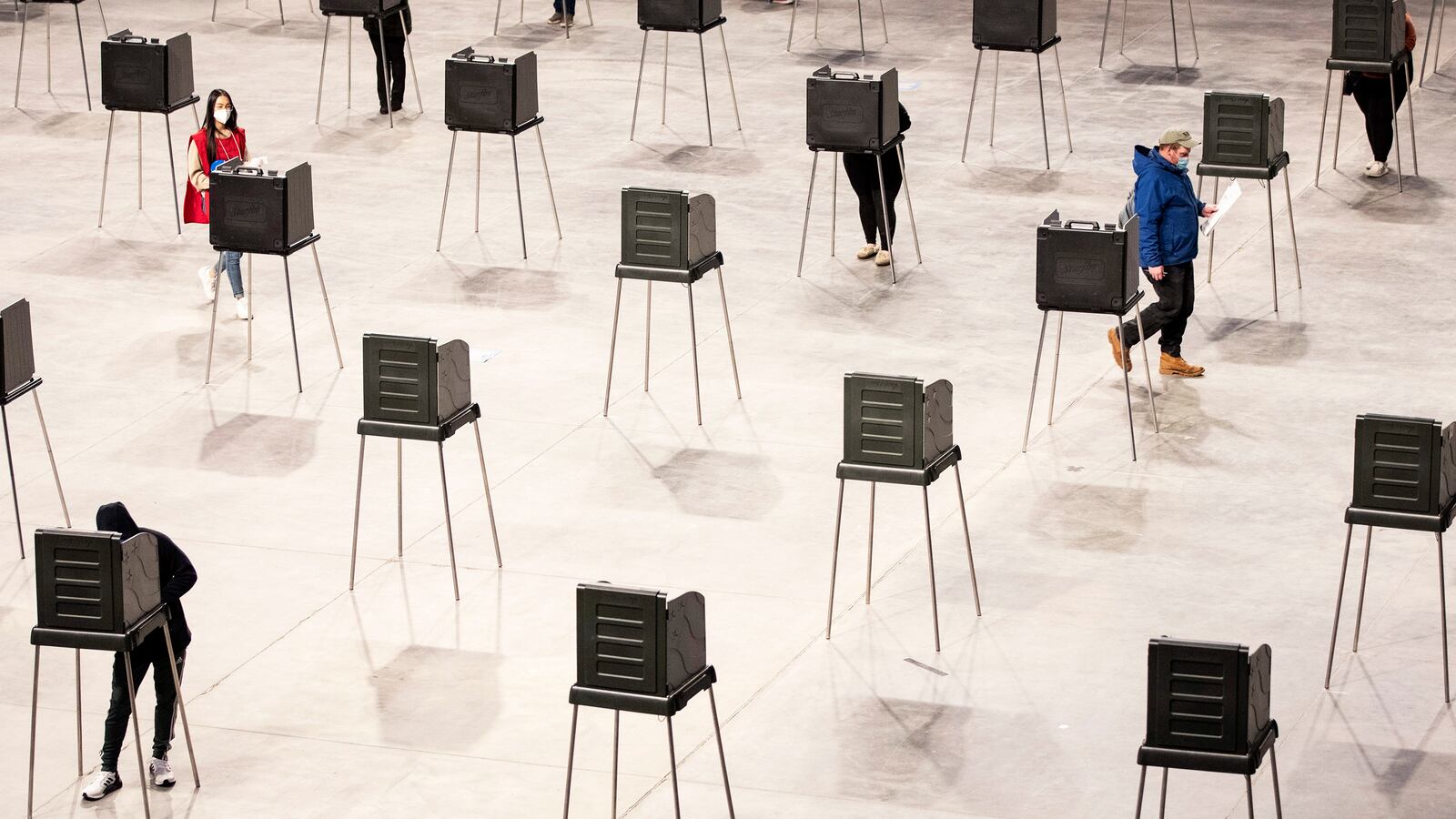Republicans and Democrats have a problem with “who” is doing the voting and, in the process, the value and worth of citizenship and the franchise is taking a beating.
On the GOP’s side of the ledger, restricting access to the ballot and electoral intimidation are features, not bugs. Indeed, in Florida and Georgia, Republicans are calling for Stasi-styled police units to handle claims of election fraud. The spirit of Jan. 6 lives on.
When Sen. Mitch McConnell publicly drew an inartful divide between “African American voters” and “Americans,” he said the quiet part aloud. From the look of things, the embers of America’s Civil War continue to glow. Hard-fought and gained voting rights are again up for grabs. Newly enacted restrictions are more than mere impediments—they are an attempt to dilute the “wrong” votes and diminish the voice of the “wrong” citizens in the process.
Meanwhile, in deep blue New York City, voting for city offices has been thrown open to all legal residents and “dreamers” who have resided in the city for more than 30 days. Non-citizens too will now have a direct say in choosing elected representatives and setting policy in America’s biggest city, which often blazes the path that Blue America is headed down.
New York’s pool of eligible voters swelled overnight by approximately 800,000, presenting another massive challenge to the city’s corrupt and inept Board of Elections. That’s more people than voted for Mayor Eric Adams in November.
Notably, Adams let the bill become law without signing it. One of his supporters, outgoing majority leader of the City Council Laurie Cumbo, loudly objected to how it diminished the votes of Black New Yorkers while noting Trump’s gains with Latino voters.
While the two parties’ moves are hardly equivalent or equal, both are responding to changing demographics and electoral outcomes. Since 1992, the GOP has lost the popular vote in seven of the last eight presidential elections, yet has twice succeeded in grasping the ring of power solely because of the mechanics of the electoral college. At best, allegations of fraud are a salve and fig leaf for political defeat for nearly half the country.
The fact is that in 2000, Al Gore garnered over a half-million more votes than George W. Bush. Meanwhile in 2016, Hillary Clinton’s popular vote plurality exceeded 2.8 million. And despite tight margins in Georgia, Arizona, Wisconsin, and Pennsylvania, Joe Biden’s winning percentage nationally (4.4 percent) actually exceeded Barack Obama’s (3.9 percent) in 2012.
Yet, 1964 was the last time a Democratic presidential candidate captured a majority of votes cast by white Americans. Beyond that, over the past half-century, the U.S. has grown less white and less Christian. Church attendance has thinned while mainline Protestantism has lost its pride of place to the evangelical movement and the thunderous cathedrals of Daytona and Talladega.
Also by the numbers, deaths exceeded births in 25 states in 2020, and U.S. life expectancy declined. Meanwhile, so-called religious “nones” occupy an ever-greater space, particularly among the young. Some of that was the pandemic, of course, but it’s also the path the nation is headed on as it ages.
At the same time, college-graduate America has grown less enamored with the GOP as it has morphed from the Party of Lincoln into the Party of Trump. Taken together, this volatile mixture of race, religion, and class make for toxic politics, mired in resentment for real and imagined lost worlds.
To be sure, convulsive tectonics were not restricted to the U.S. In Great Britain, voters opted for Brexit and withdrawal from the European Union. On both sides of the Atlantic, those who felt left behind by history made their voices heard.
Yet growing diversity has not delivered to the Democrats the political success they were counting on. The party’s reflexive worship at the twin altars of identity politics and political correctness exacted a stiff and steep price in votes and lives.
Demands for defunding the police voiced by Democratic firebrands Alexandria Ocasio-Cortez and Rashida Tlaib and progressive stalwarts such as Planned Parenthood and Ben & Jerry’s have harmed far more than they have helped. America’s murder rate took an upward jolt in the aftermath of Ferguson and again in 2020. And it was the inner cities that bore the brunt.
Against this backdrop, New York City’s latest gambit appears to be a less lethal bit of pie-in-the sky thinking. Aside from being legally questionable, it serves as a reminder of the gap between the Big Apple and the rest of the country (and, notably, prominent New York Democrats serving in Washington were conspicuously silent about non-citizen voting), a distinction not in the city’s best interest, particularly as the Republicans are likely to regain control of the House and Senate in less than a year.
Writing about America’s first astronauts and the ticker tape reception they received in New York City in the early 1960s, the late Tom Wolfe observed in his book The Right Stuff, which looked at America’s early space program: “Like most military people… [the astronauts] didn’t really consider New York part of the US. It was like a free port, a stateless city, an international protectorate, Danzig in the Polish Corridor.”
Earlier this month, New York’s Republican and conservative stalwarts commenced a lawsuit to block the city’s new non-citizen voting law on the grounds that it violated the rights of the state’s citizens. Yet in the aftermath of the insurrection, four of New York state’s Republican members of Congress voted against certifying the results of the presidential election—even as they took their own seats.
Apparently, the value accorded to each citizen’s vote is not identical. Some are more equal than others.






